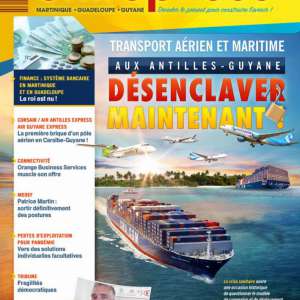OHADAC featured in February 2021 edition of Inter-Entreprises magazine with article on: Cabotage in the Caribbean: Is it time to reform the system?
- 2021-05-20
- 3960
The OHADAC project comes under the spotlight again in the February 2021 edition of Inter-Entreprises (Martinique, Guadeloupe and Guyana) in a special report on air and maritime transport in the Antilles-Guyana region that asks the question: Has the time come to open up?
Denis Lesueur is interviewed about the economic and commercial opening up of the Caribbean region, while Anaïs Leray analyses the specific issue of the law as it applies to cabotage.
Denis Lesueur is president of the Economic Forecasting and Regional Cooperation Commission at the Chamber of Commerce and Industry of the Islands of Guadeloupe. In addition, he is the leader of the project to establish the CARO Centre and CEO of the Loret Group in Guadeloupe, Martinique and Guyana.
In the article, Denis Lesueur first highlights the almost vital importance of opening up in a region that, although fragmented, is also united by a common history, culture and geography - and, most of all, by shared needs.
Denis Lesueur then discusses the resources being considered to make this opening up possible, including reforming business law and implementing projects organised at regional level.
To pursue this approach and the goal of opening up, Denis Lesueur restates the merits of - and need for - the OHADAC project, which promotes the standardisation of business law in the Caribbean region with the particular aim of securing contracts. Setting up a regional Centre for Arbitration and Mediation fits in with the goal of developing trade and commerce in the Caribbean region and caters to the needs of French overseas companies.
The full interview with Denis Lesueur is available on page 46 of the attached issue.
Anaïs Leray, who is from Guadeloupe and who is very attached to her island and region, was the first OHADAC intern. Anaïs - who trained and obtained degrees in Canada, France and the United States - is currently an LL.M. student at the prestigious American University of Georgetown, where she is specialising in international arbitration.
Anaïs was invited by Inter-Entreprises to share her expertise and thoughts on cabotage in the Caribbean region.
Anaïs Leray also begins with an observation: cabotage as it exists today in the Overseas Departments and the Caribbean was designed and developed mainly for maritime transport in Europe.
She then repeats the definition of cabotage: “Short sea shipping (SSS), also known as ‘cabotage', is defined by the European Commission (EC) in EEC Regulation No. 3577/92 as ‘the movement of cargo and passengers by sea between ports situated in geographical Europe or between those ports and ports situated in non-European countries having a coastline on the enclosed seas bordering Europe'”.
This means that the current regulatory and legal system is inadequate from the perspective of the Caribbean region and the Overseas Departments since it is based on a European view of maritime transport. In addition, the interest shown in this mode of transport comes up against the wide variety of applicable rules in a region with fragmented legal systems - a legal pluralism that hinders cooperation in the context of simple commercial inter-island activities.
Leray lays stress on the crucial lack of legislative harmonisation and all the missed commercial opportunities in an area that is nevertheless rich in economic terms.
She also underlines the need to draw up a better legal framework for cabotage in order to promote inter-island trade. She restates the unique position of the overseas regions and their non-European neighbours in a land-locked area that is hampered by the legal and regulatory diversity. Anaïs Leray highlights the correlation between importing goods from far-off regions and the high cost of overseas life.
Anaïs Leray makes the case for a broader debate on cabotage with the aim of improving economic development and cooperation in the region, additionally calling for the harmonisation of administrative and customs rules. As a further solution, she suggests multilateral treaties should be ratified as a way of introducing more effective trade rules.
Anaïs Leray argues that if this type of restructuring were undertaken, it would have a real impact on the cost of living by helping to put an end to the quasi-monopolies observed in the sector, and by speeding up the supply of fresh products in our departments.
Anaïs Leray's full analysis is available on page 40 of the attached issue.
For more information, you are invited to send a message to the following address: contact@ohadac.com.







